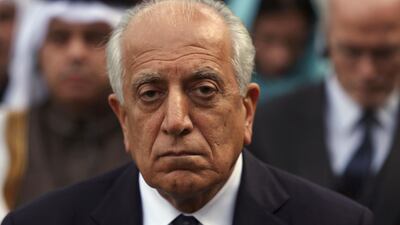Washington has sent its special envoy for Afghanistan to press for peace talks between the government and Taliban fighters.
Zalmay Khalilzad is scheduled to visit Kabul during a trip with stops in five nations.
Mr Khalilzad left on Friday to travel to Qatar, Afghanistan, Pakistan, Norway and Bulgaria, the US State Department said on Saturday.
The US is reducing its troop numbers in Afghanistan under an agreement struck with the Taliban in February.
The deal was to pave the way for formal peace talks between the insurgents and the Afghan government and Mr Khalilzad's task is to try and bring both sides to the table.
He will urge a deal on prisoner exchanges and a reduction in violence, two issues that have hampered progress towards peace talks.
"Although significant progress has been made on prisoner exchanges, the issue requires additional effort to fully resolve," the department said.
Under the US-Taliban agreement, the Afghan government is supposed to release 5,000 insurgent prisoners while the Taliban free 1,000 government inmates.
The government has released about 4,200 prisoners so far but is refusing to free some of those on the Taliban's list because of the seriousness of the crimes they committed.
It also says some of the freed prisoners have rejoined the fight against government forces.
The Taliban, who have released more than 800 prisoners so far, on Sunday accused the government of rearresting freed insurgents, a claim the National Security Council denied.
Despite the deadlock, the Taliban this week announced a team for negotiations with the government and said the talks could begin after Eid Al Adha if the prisoner swap was completed.
Suhail Shaheen, spokesman for the Taliban's political office in Doha, said the 20-member team would be led by Abdul Ghani Baradar, one of the founders of the group, who led the negotiations with the US in the Qatari capital.
The prospect of talks starting soon is also clouded by continuing differences between President Ashraf Ghani and his main political rival, Dr Abdullah Abdullah, despite a power-sharing agreement reached this year.
The deal signed in May gave Dr Abdullah the post of head of the High Council for National Reconciliation and half of the posts in the Cabinet to his nominees..
But reports in Afghan media say there is a continuing dispute over the suitability of three candidates he put forward.
The presidential palace expected "eligible and qualified" people to be picked for the Cabinet, Mr Ghani's spokesman told the Tolo news agency.
But Dr Abdullah's spokesman insisted the candidates were "qualified and elite people".

